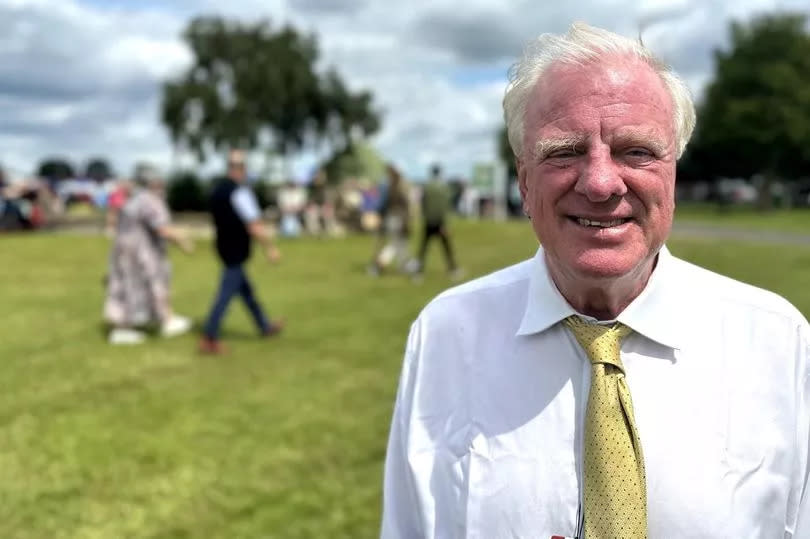Lincolnshire council leaders 'bolstered' by election manifestos which could be good news for devolution deal

Council leaders in Lincolnshire say they feel bolstered by the commitments of multiple political parties to hand more financial powers to local authorities in their general election manifestos, suggesting it could spell good news for the proposed devolution deal for the Greater Lincolnshire region.
Devolution of Lincolnshire County Council, North Lincolnshire Council, and North East Lincolnshire Council to create a Mayoral Combined County Authority for Greater Lincolnshire was agreed last year and submitted to government. However, after calling the general election, central government did not sign off on the deal in time, so it is on ice until after the election on July 4 — though council leaders in the county have ample reason to be excited.
A mainstay aspect of many of the main political parties and their election manifestos is handing over of greater powers and financial resources to local authorities, something which Lincolnshire’s councils have been requesting for years. The leaders of both North East Lincolnshire and Lincolnshire County Council spoke to Local Democracy Reporters at the Lincolnshire Show, the annual celebration of our county held at the Lincolnshire Showground on June 19-20, 2024.
READ MORE:
Cllr Philip Jackson (Conservative), the leader of North East Lincolnshire Council said it was important for political parties to “recognise we need to have more decision making closer to people” and felt reassured by these political commitments on devolution.
“Government finds it much easier to work with one figurehead in a community area, so the mayors up and down the country are proving themselves to be very effective advocates for their communities.
“Of course local authorities will continue to operate as they are and deliver services as they are, but in terms of making major strategic decisions, I think having that mayoral authority in place is a way to focus that.
“I just hope whichever government is in power on July 5, that we continue the journey that we’ve already started with the Greater Lincolnshire devolution deal, because we are so close to delivering it now.

“The message we are getting from businesses and communities is they just want to get on with it and want the extra powers and resources directly to the county.”
Martin Hill, leader of Lincolnshire County Council said it was “important” for the Greater Lincolnshire region to embrace the opportunity devolution presents, given the support shown by major political parties in their manifestos.
“At the moment because of the general election it is on hold, so we will have to see who the new minister is come July 5, and then obviously talk to them to hopefully get the deal over the line.
“We want to keep Lincolnshire as a whole entity in its own right, rather than part of the East Midlands or something like that, so that’s very important — but also being able to work closely with businesses to bring even more investment into the area, more jobs, more skills, and I think that will be to the benefit of everybody.”
That isn’t to say there is unanimous excitement around the prospect of Greater Lincolnshire devolution in the local democracy sector, though.
Sir Edward Leigh, who has served as the Conservative Member of Parliament for Gainsborough for four decades and is seeking re-election on July 4, said there was “no enthusiasm” for an elected mayor as part of the deal.
“The county council were caught between a rock and a hard place,” he explained. “Because they were told if you don’t have the elected mayor you won’t get the money.
“But it’s our money anyway and we’ll just have to put up with it now, it’s obviously going to happen, we just have to make it work. It will mean we’ll have an elected mayor, a county council, a district council, a town council, a parish council, an MP, a police and crime commissioner — it’s all too many layers of government — so if we do have this mayor, it’s going to have to be mayor-lite, with low staff and the rest.”
West Lindsey District Council leader Trevor Young (Liberal Democrat) said the annual £24 million total given to the region as a trade-off for the devolution deal is a “very small budget” and questioned how far that could go.

“Realistically, how much will it deliver? We don’t think it will be very much,” he said. “Our biggest worry is about the representation from each of the seven district councils and how limited that will be.
“We’ve only got four seats around the table and it’s very clear you could be four years before you get a seat to represent people’s needs.”
This is in reference to the four seats available for district councils on the Mayoral Combined County Authority, which will also consist of an elected mayor for Greater Lincolnshire, the three upper-tier councils, a police and crime commissioner representative and six “non-constituent” and associate members.
These fears were rejected by Cllr Martin Hill of Lincolnshire County Council, saying they have been “much more inclusive” than other Mayoral Combined Authorities nearby to Lincolnshire, namely the East Midlands.
“We’ve got twice as many districts on our board, so frankly I don’t really buy that argument, and what we need to do now is make sure that we all work together and make sure this deal gets over the line.
“I really think we need to get behind the deal and just move on.”
This was echoed by Cllr Philip Jackson of North East Lincolnshire Council, who pointed to the successes of other mayoral authorities in the country — such as Greater Manchester and Tees Valley — in representing the people and securing funding for their respective areas.

 Yahoo News
Yahoo News 
